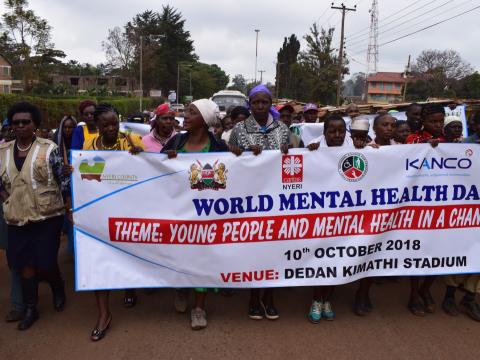Low Cost Approach To Tackle Mental Illness In Kenya

By Sarah Ooko, Senior Communications & Media Officer, World Vision Kenya
Christine, now in her twenties, suffered from mental health challenges during her teenage years.The problems began after she joined high school and got bullied by senior students.
“They would force me to do chores for them like making beds or washing utensils. Whenever I objected, they would shun or hurl abuse at me,” said Christine.
“I felt so lonely and lost. It was a boarding school, so my parents weren't there and I missed them so much.”
The traumatic experience made Christine develop depression which she battled with for years. Many young people such as her, face similar challenges that result in long periods of stress that eventually lead to serious mental health ailments. This causes alot of suffering and disability to those affected.
Based on the World Health Organisation (WHO) statistics, between 10 and 20 percent of children and adolescents globally suffer from mental disorders like depression.
Symptoms of the disease include loss of interest in activities previously enjoyed, inability to carry out daily duties, indecisiveness, restlessness, loss of energy, sleep problems, hopelessness and feelings of worthlessness.
These symptoms make depressed people to suffer from low moods and begin having thoughts of self harm or suicide. Currently, suicide is the leading cause of death among 15 to 29 year old people globally, according to the WHO.
"Mental illness is a major problem in Kenya. But due to low awareness, stigma and discrimination, the condition is still rife in the country," said Jacinta Sila, mental health expert at World Vision Kenya.
Jacinta Sila, Mental Health Expert, World Vision Kenya. ©World Vision/Photo by Sarah Ooko
She stated: "We need to educate the society on how to effectively manage stress so as to prevent adverse health effects associated with mental illness."
For this to happen, mental health services should be made readily available and accessible to all Kenyans in need of them.
Yet psychiatrists, clinical psychologists and medical social workers who are central to the management and treatment of mental illness are few and largely concentrated in major urban centres.
With the aim of bridging this human resource gap, World Vision Kenya - in partnership with the Ministry of Health (MOH) - has been training community health volunteers (CHVs) on how to address common mental health problems so they can effectively offer assistance to people suffering from them.
The training focuses on a novel cost-effective method for treating common mental illnesses - such as depression, anxiety and chronic stress - known as Problem Management Plus (PM+). It has been approved by the World Health Organisation.
This new approach helps people to self manage mental problems arising from life challenges such as unemployment, conflicts, violence and relationship issues.
Through PM+, depressed individuals learn stress management tactics and problem solving skills. They are also sensitised on ways to fight the mental illness by engaging in activities they enjoy and building a social support network of people to go to, while feeling stressed.
Once the health volunteers have been trained on PM+, they become empowered to offer assistance to depressed individuals in their communities under the supervision of national and county health teams.
But they only deal with basic mental health problems. Severe cases are referred to skilled mental health specialists in County Hospitals.
So far, World Vision has implemented the new mental health intervention in Nairobi, Nakuru, Nyeri and Nyamira.
Over 1,500 community health volunteers have been trained on PM+ in the four counties. In addition, more than 6,000 people - adult men and women - have benefitted from their service hence being more capable of effectively managing and preventing mental illness. This has helped to improve the wellbeing of their families and children.
"In these areas, we realised that families became more empowered to manage and prevent mental illness due to the support or help offered by the trained and supervised community health volunteers. They were thus able to offer a stress free environment for their children,"Jacinta said.
Due to the success of the initiative, the MOH has adopted the PM+ model and plans to scale it up so as to enhance access to mental health services in the country.
